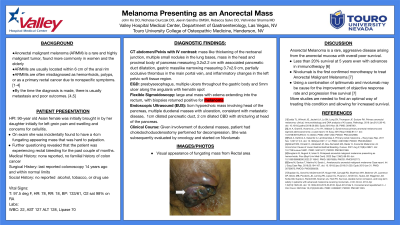Tuesday Poster Session
Category: Colon
P3079 - Melanoma Presenting as Anorectal Mass
Tuesday, October 24, 2023
10:30 AM - 4:00 PM PT
Location: Exhibit Hall

Has Audio

John Ko, DO
Valley Hospital Medical Center
Las Vegas, NV
Presenting Author(s)
Award: Presidential Poster Award
John Ko, DO1, Rebecca Salvo, DO1, Nicholas Ciurczack, DO1, Jeevin Sandhu, 2, Vishvinder Sharma, MD1
1Valley Hospital Medical Center, Las Vegas, NV; 2Tour University Nevada, Henderson, NV
Introduction: Anorectal malignant melanoma (ARMM) is a rare and highly malignant tumor, more often found in women and the elderly with lesions often located within 6cm of the anal rim. It is often misdiagnosed as hemorrhoids, polyps, or rectal cancer because symptoms are nonspecific. By the time the correct diagnosis is made, there is usually metastasis and poor outcomes. We present a case of metastatic ARMM that was earlier misdiagnosed as hemorrhoids.
Case Description/Methods: 90-year old Asian female with no past medical history was initially admitted for groin cellulitis. However, physical exam incidentally revealed a 4 cm tender firm mass in the rectum. Upon questioning, the patient reported constipation and rectal bleeding for 1 year and told that it was likely hemorrhoids. Initial labs showed WBC 22 AST 127, ALT 128, and lipase 70. CT abdomen/pelvis with IV contrast demonstrated a mass like thickening of the rectoanal junction, multiple small nodules in the lung bases, mass in the head and proximal body of pancreas measuring 3.2x2.2 cm with associated pancreatic duct dilatation, gastric masslike narrowing measuring 3.7x2.9 cm, partially occlusive thrombus in the main portal vein, and inflammatory changes in the left pelvic soft tissue region. Given these findings, she underwent endoscopic evaluation.
EGD demonstrated multiple ulcers in the gastric body and a 5mm ulcer along the angularis with a hematin spot. Flexible sigmoidoscopy redemonstrated the large anal mass with edema extending into the rectum. Multiple biopsies were taken and demonstrated malignant melanoma. She underwent an EUS for further evaluation of pancreatic head mass which demonstrated a large 5-6 cm hypoechoic mass involving the head of the pancreas, multiple duodenal masses with ulceration highly consistent with metastatic disease. Because of involvement of the duodenum with masses, choledochoduodenostomy was performed to allow for decompression. The patient was evaluated by oncology and started on Nivolumab.
Discussion: ARMM survival has historically been poor with less than 20% survival at 5 years at all stages of the disease even with advances in immunotherapy. Nivolumab was the first confirmed monotherapy to treat AARM in a study done by Topalian et al. Preclinical evidence suggests synergistic combinations based on PD-1 pathway blockage can have more potent effects on treatment. The favorable therapeutic index of nivolumab as monotherapy supports its testing in treatment. More studies are needed to verify its efficacy.
Disclosures:
John Ko, DO1, Rebecca Salvo, DO1, Nicholas Ciurczack, DO1, Jeevin Sandhu, 2, Vishvinder Sharma, MD1. P3079 - Melanoma Presenting as Anorectal Mass, ACG 2023 Annual Scientific Meeting Abstracts. Vancouver, BC, Canada: American College of Gastroenterology.
John Ko, DO1, Rebecca Salvo, DO1, Nicholas Ciurczack, DO1, Jeevin Sandhu, 2, Vishvinder Sharma, MD1
1Valley Hospital Medical Center, Las Vegas, NV; 2Tour University Nevada, Henderson, NV
Introduction: Anorectal malignant melanoma (ARMM) is a rare and highly malignant tumor, more often found in women and the elderly with lesions often located within 6cm of the anal rim. It is often misdiagnosed as hemorrhoids, polyps, or rectal cancer because symptoms are nonspecific. By the time the correct diagnosis is made, there is usually metastasis and poor outcomes. We present a case of metastatic ARMM that was earlier misdiagnosed as hemorrhoids.
Case Description/Methods: 90-year old Asian female with no past medical history was initially admitted for groin cellulitis. However, physical exam incidentally revealed a 4 cm tender firm mass in the rectum. Upon questioning, the patient reported constipation and rectal bleeding for 1 year and told that it was likely hemorrhoids. Initial labs showed WBC 22 AST 127, ALT 128, and lipase 70. CT abdomen/pelvis with IV contrast demonstrated a mass like thickening of the rectoanal junction, multiple small nodules in the lung bases, mass in the head and proximal body of pancreas measuring 3.2x2.2 cm with associated pancreatic duct dilatation, gastric masslike narrowing measuring 3.7x2.9 cm, partially occlusive thrombus in the main portal vein, and inflammatory changes in the left pelvic soft tissue region. Given these findings, she underwent endoscopic evaluation.
EGD demonstrated multiple ulcers in the gastric body and a 5mm ulcer along the angularis with a hematin spot. Flexible sigmoidoscopy redemonstrated the large anal mass with edema extending into the rectum. Multiple biopsies were taken and demonstrated malignant melanoma. She underwent an EUS for further evaluation of pancreatic head mass which demonstrated a large 5-6 cm hypoechoic mass involving the head of the pancreas, multiple duodenal masses with ulceration highly consistent with metastatic disease. Because of involvement of the duodenum with masses, choledochoduodenostomy was performed to allow for decompression. The patient was evaluated by oncology and started on Nivolumab.
Discussion: ARMM survival has historically been poor with less than 20% survival at 5 years at all stages of the disease even with advances in immunotherapy. Nivolumab was the first confirmed monotherapy to treat AARM in a study done by Topalian et al. Preclinical evidence suggests synergistic combinations based on PD-1 pathway blockage can have more potent effects on treatment. The favorable therapeutic index of nivolumab as monotherapy supports its testing in treatment. More studies are needed to verify its efficacy.
Disclosures:
John Ko indicated no relevant financial relationships.
Rebecca Salvo indicated no relevant financial relationships.
Nicholas Ciurczack indicated no relevant financial relationships.
Jeevin Sandhu indicated no relevant financial relationships.
Vishvinder Sharma indicated no relevant financial relationships.
John Ko, DO1, Rebecca Salvo, DO1, Nicholas Ciurczack, DO1, Jeevin Sandhu, 2, Vishvinder Sharma, MD1. P3079 - Melanoma Presenting as Anorectal Mass, ACG 2023 Annual Scientific Meeting Abstracts. Vancouver, BC, Canada: American College of Gastroenterology.

